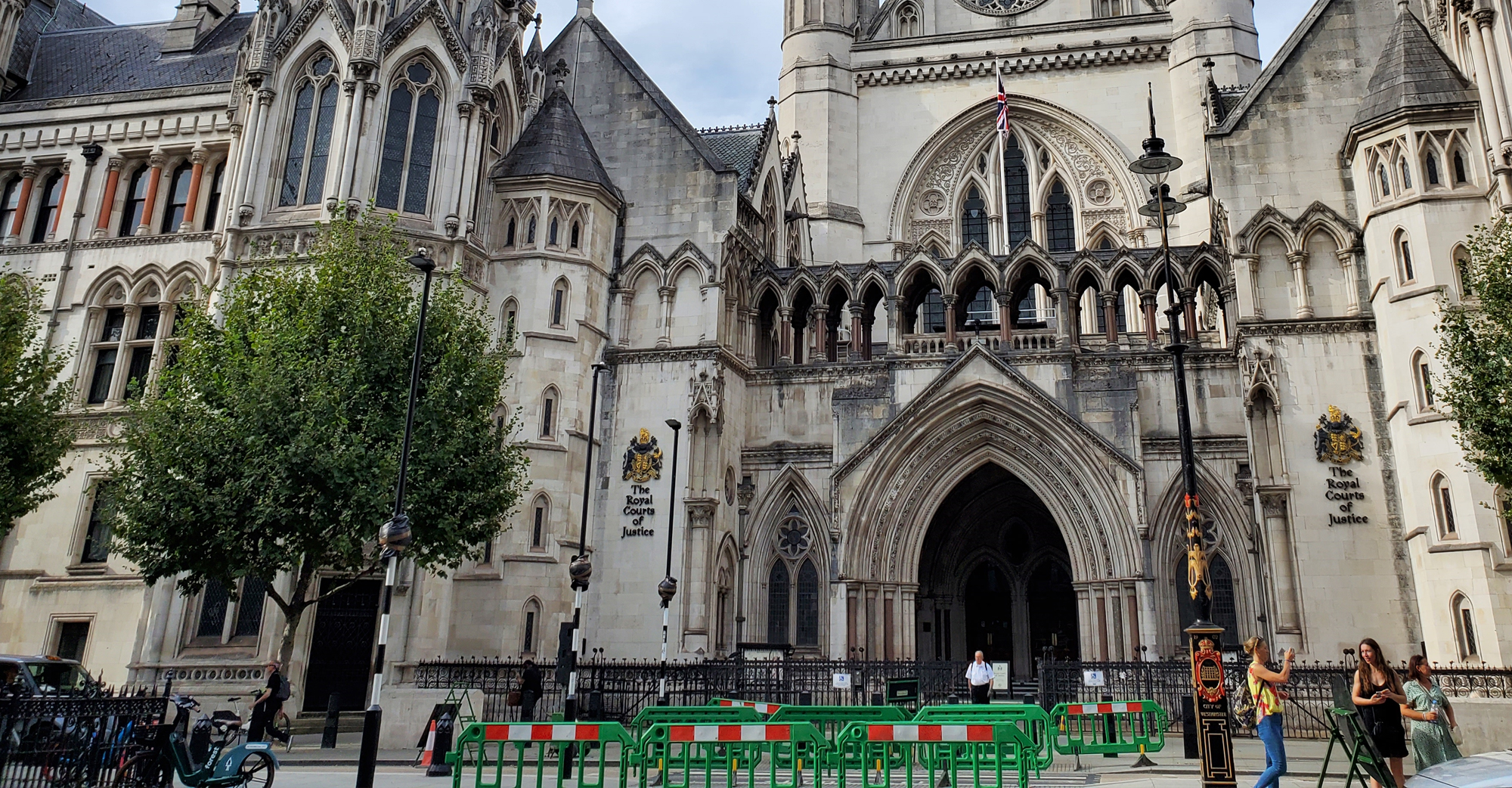Is Holland a nation? Did Russian Czar Peter the Great ban beards? These and more are in our new Global Trivia game, Part 17.
Global Trivia 17
You have multiple choices. An explanation and a reference comes after every question. There is no fixed order so you can choose from any of the boxes. The SHADED BOXES are what you already answered. Your final score is at the END. Don't hit REFRESH unless you want to start all over. This is part of a continuing series in Traveling Boy.
Start
Congratulations!
You have completed Global Trivia 17.

You scored %%SCORE%% out of a possible 5 points.
Your performance was: %%RATING%%
Your answers are highlighted below.
Question 1 |
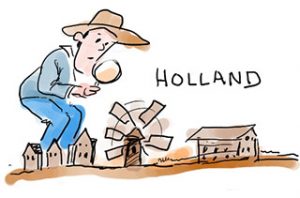
Is Holland a nation?
A | Yes |
B | No |
Question 1 :
B. No
Only the central part of the Netherlands is geographically named Holland. This part of the Netherlands consists of two provinces Noord Holland (North Holland) and Zuid Holland (South Holland). This is the region where important cities such as Amsterdam, Rotterdam, The Hague (Den Haag), Delft, Leiden and Haarlem are located, making it confusing for some visitors.
Only the central part of the Netherlands is geographically named Holland. This part of the Netherlands consists of two provinces Noord Holland (North Holland) and Zuid Holland (South Holland). This is the region where important cities such as Amsterdam, Rotterdam, The Hague (Den Haag), Delft, Leiden and Haarlem are located, making it confusing for some visitors.
Question 2 |
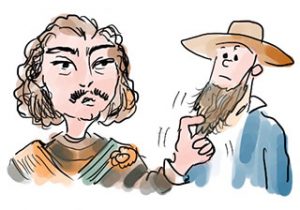
Did Czar Peter the Great institute a ban on wearing beards in the Russian Empire?
A | Yes |
B | No |
Question 2 :
B. No
But he tried by instituting a beard tax to bring Russian elite in line with Western European models. To enforce the taxation on beards, the tsar empowered police to forcibly and publicly shave those who refused to pay the tax.
Born in Moscow, Peter the Great (1672 – 1725) was the Russian czar who transformed Russia from an isolated agricultural society into an Empire on a par with European powers. He moved the Russian Empire’s capitol city of Moscow to St. Petersburg, built on a marsh on the eastern edge of the Baltic Sea, as Russia’s Window to the West. His visits to the West impressed upon him the notion that European customs were in several respects superior to Russian traditions. As Peter toured Europe (sometimes in disguise to avoid being recognized) he educated himself in ship building and science. Mirroring Western culture, he introduced new administrative and territorial divisions, modernized the Russian alphabet, secularized schools and administered greater control over the reactionary Orthodox Church.In 1698, he instituted a beard tax to bring Russian elite in line with Western European models. To enforce the ban on beards, the tsar empowered police to forcibly and publicly shave those who refused to pay the tax. Peter was not solely content with having a more European economy. He also implemented hard line social and cultural reforms such as forcing Russian nobility to wear European-style dress in his court, attempts to end arranged marriages, and the introduction of the Julian Calendar in 1700. He reorganized the Russian army along modern lines and began making Russia a maritime power. One of Peter’s most audacious goals was reducing the influence of the boyars, or the feudal elite class. He did this by imposing taxes and services on them as well as creating comprehensive administrative reforms that opened civil service to commoners. However, sharp class divisions, including the already tragic fate of serfs, only deepened. Tax and trade reforms enabled the Russian state to expand its treasury almost six-fold between 1680 and 1724. Peter acquired territory in Estonia, Latvia and Finland; and through several wars with Turkey in the south, he secured access to the Black Sea. In 1709, he defeated the Swedish army by purposely directing their troops to the city of Poltava, in the midst of an unbearable Russian winter. It was in 1712 when Peter established the city of St. Petersburg on the Neva River and moved the capital there from its former location in Moscow. In 1725 he dove in the water to help rescue some drowning sailors; he ended up with a bad cold and died a short time later.
But he tried by instituting a beard tax to bring Russian elite in line with Western European models. To enforce the taxation on beards, the tsar empowered police to forcibly and publicly shave those who refused to pay the tax.
Born in Moscow, Peter the Great (1672 – 1725) was the Russian czar who transformed Russia from an isolated agricultural society into an Empire on a par with European powers. He moved the Russian Empire’s capitol city of Moscow to St. Petersburg, built on a marsh on the eastern edge of the Baltic Sea, as Russia’s Window to the West. His visits to the West impressed upon him the notion that European customs were in several respects superior to Russian traditions. As Peter toured Europe (sometimes in disguise to avoid being recognized) he educated himself in ship building and science. Mirroring Western culture, he introduced new administrative and territorial divisions, modernized the Russian alphabet, secularized schools and administered greater control over the reactionary Orthodox Church.In 1698, he instituted a beard tax to bring Russian elite in line with Western European models. To enforce the ban on beards, the tsar empowered police to forcibly and publicly shave those who refused to pay the tax. Peter was not solely content with having a more European economy. He also implemented hard line social and cultural reforms such as forcing Russian nobility to wear European-style dress in his court, attempts to end arranged marriages, and the introduction of the Julian Calendar in 1700. He reorganized the Russian army along modern lines and began making Russia a maritime power. One of Peter’s most audacious goals was reducing the influence of the boyars, or the feudal elite class. He did this by imposing taxes and services on them as well as creating comprehensive administrative reforms that opened civil service to commoners. However, sharp class divisions, including the already tragic fate of serfs, only deepened. Tax and trade reforms enabled the Russian state to expand its treasury almost six-fold between 1680 and 1724. Peter acquired territory in Estonia, Latvia and Finland; and through several wars with Turkey in the south, he secured access to the Black Sea. In 1709, he defeated the Swedish army by purposely directing their troops to the city of Poltava, in the midst of an unbearable Russian winter. It was in 1712 when Peter established the city of St. Petersburg on the Neva River and moved the capital there from its former location in Moscow. In 1725 he dove in the water to help rescue some drowning sailors; he ended up with a bad cold and died a short time later.
Question 3 |
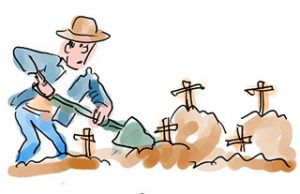
What nation suffered the most deaths (combined: soldiers & civilians) in World War 1?
A | Austro-Hungarian Empire |
B | France |
C | Germany |
D | Great Britain & Ireland |
E | Italy |
F | Russia |
G | Turkey |
H | U.S. |
Question 3 :
F. Russia - 2,754,369
The total number of military and civilian casualties in World War I, was around 40 million. There were 20 million deaths and 21 million wounded. The total number of deaths includes 9.7 million military personnel and about 10 million civilians.
See the complete list here.
The total number of military and civilian casualties in World War I, was around 40 million. There were 20 million deaths and 21 million wounded. The total number of deaths includes 9.7 million military personnel and about 10 million civilians.
See the complete list here.
Question 4 |
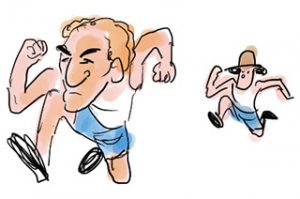
At the 1936 Olympics in Berlin, Hitler planned to show the world that the Aryan people were the dominant race, but U.S. track star Jesse Owens proved him wrong, winning four gold medals over six days. But name the American track and field sprinter who won the silver medal in Men's 100 metres in the same race?
A | Harold Abrahams |
B | Linford Christie |
C | Michael Johnson |
D | Eric Liddell |
E | Ralph Harold Metcalfe Sr. |
Question 4 :
E: Ralph Harold Metcalfe Sr. was an American track and field sprinter and politician. He jointly held the world record in the 100-meter dash and placed second in to Jesse Owens at the 1936 Olympics in Berlin, Germany.
Although Jesse Owens is remembered as the great sprinter of the 30s, Ralph Metcalfe was on many counts Owens' superior. Metcalfe was at his best between the 1932 and 1936 Olympics and he won both sprints at the AAU and NCAA for three straight years (1932-34) and won the AAU 200m in 1935-36 to give him a record of five straight wins in this event. Metcalfe, who attended Marquette, equaled the world record of 10.3 for 100m six times, but only three of those clockings reached the record books. In the 1932 Olympic 200m, Metcalfe may have been unfairly deprived of a gold medal when it was later shown that the lane in which he ran was about two meters longer than it should have been. Metcalfe graciously declined a protest and a re-run because the American threesome of [Eddie Tolan], [George Simpson], and himself had swept the medals in the event. Ralph Metcalfe later became well known in Chicago politics, serving on the city council under Mayor Daley for many years. In 1970, Metcalfe was elected to the U.S. Congress from the 1st District in Illinois, serving until his death. He also gave yeoman service to the USOC, being elected to their board of directors in 1969.
Although Jesse Owens is remembered as the great sprinter of the 30s, Ralph Metcalfe was on many counts Owens' superior. Metcalfe was at his best between the 1932 and 1936 Olympics and he won both sprints at the AAU and NCAA for three straight years (1932-34) and won the AAU 200m in 1935-36 to give him a record of five straight wins in this event. Metcalfe, who attended Marquette, equaled the world record of 10.3 for 100m six times, but only three of those clockings reached the record books. In the 1932 Olympic 200m, Metcalfe may have been unfairly deprived of a gold medal when it was later shown that the lane in which he ran was about two meters longer than it should have been. Metcalfe graciously declined a protest and a re-run because the American threesome of [Eddie Tolan], [George Simpson], and himself had swept the medals in the event. Ralph Metcalfe later became well known in Chicago politics, serving on the city council under Mayor Daley for many years. In 1970, Metcalfe was elected to the U.S. Congress from the 1st District in Illinois, serving until his death. He also gave yeoman service to the USOC, being elected to their board of directors in 1969.
Question 5 |
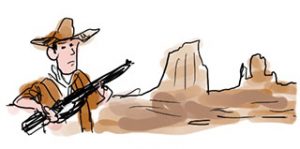
Name the 60’s British Invasion band whose name stemmed from a John Ford film.
A | 3 Godfathers |
B | The Horse Soldiers |
C | The Hurricane (The Hurricanes) |
D | The Searchers |
E | Wagon Master (The Wagon Masters) |
Question 5 :
D. The Searchers
The Searchers were an English Merseybeat group who emerged in the 1960s along with the Beatles, the Hollies, the Fourmost, the Merseybeats, the Swinging Blue Jeans, and Gerry and the Pacemakers. Founded as a skiffle group in Liverpool in 1959 by John McNally and Mike Pender, the band took their name from the 1956 John Ford western film The Searchers.
The Searchers were an English Merseybeat group who emerged in the 1960s along with the Beatles, the Hollies, the Fourmost, the Merseybeats, the Swinging Blue Jeans, and Gerry and the Pacemakers. Founded as a skiffle group in Liverpool in 1959 by John McNally and Mike Pender, the band took their name from the 1956 John Ford western film The Searchers.
Once you are finished, click the button below. Any items you have not completed will be marked incorrect.
Get Results
There are 5 questions to complete.
You have completed
questions
question
Your score is
Correct
Wrong
Partial-Credit
You have not finished your quiz. If you leave this page, your progress will be lost.
Correct Answer
You Selected
Not Attempted
Final Score on Quiz
Attempted Questions Correct
Attempted Questions Wrong
Questions Not Attempted
Total Questions on Quiz
Question Details
Results
Date
Score
Hint
Time allowed
minutes
seconds
Time used
Answer Choice(s) Selected
Question Text
All done
Deplorable! You need to travel more! This is pathetic!
Deplorable! You need to travel more! This is pathetic!
Embarrassing! Keep trying! We know you're better than that. Play the game again.
Not that bad! But not good either. Play the game again.
Pretty good ... but not perfect.
Perfect! Are you brilliant traveler or what?
